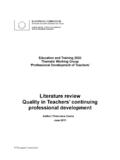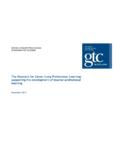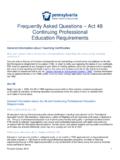Transcription of Curriculum Journal Benefits, status and effectiveness …
1 This article was downloaded by: [Opfer, Darleen]. On: 20 December 2010. Access details: Access Details: [subscription number 930408914]. Publisher Routledge Informa Ltd Registered in England and Wales Registered Number: 1072954 Registered office: Mortimer House, 37- 41 Mortimer Street, London W1T 3JH, UK. Curriculum Journal Publication details, including instructions for authors and subscription information: ~content=t713695259. Benefits, status and effectiveness of continuous professional development for teachers in England V.
2 Darleen Opfera; David Peddera a Faculty of Education, University of Cambridge, Cambridge, UK. Online publication date: 01 December 2010. To cite this Article Opfer, V. Darleen and Pedder, David(2010) 'Benefits, status and effectiveness of continuous professional development for teachers in England', Curriculum Journal , 21: 4, 413 431. To link to this Article: DOI: URL: PLEASE SCROLL DOWN FOR ARTICLE. Full terms and conditions of use: This article may be used for research, teaching and private study purposes. Any substantial or systematic reproduction, re-distribution, re-selling, loan or sub-licensing, systematic supply or distribution in any form to anyone is expressly forbidden.
3 The publisher does not give any warranty express or implied or make any representation that the contents will be complete or accurate or up to date. The accuracy of any instructions, formulae and drug doses should be independently verified with primary sources. The publisher shall not be liable for any loss, actions, claims, proceedings, demand or costs or damages whatsoever or howsoever caused arising directly or indirectly in connection with or arising out of the use of this material. The Curriculum Journal Vol. 21, No.
4 4, December 2010, 413 431. Bene ts, status and e ectiveness of continuous professional development for teachers in England V. Darleen Opfer* and David Pedder Faculty of Education, University of Cambridge, Cambridge, UK. Reported here is one part of the nationally representative, Schools and Continuing professional development in England State of the Nation research study which was funded by the Training and development Downloaded By: [Opfer, Darleen] At: 11:10 20 December 2010. Agency for Schools (TDA). This paper sets out to understand how teachers and school leaders in England perceive the bene ts and e ectiveness of CPD activity.
5 The investigation of bene ts and e ectiveness of CPD presented in the paper focuses on the various impacts that could result from participation, the forms and features of activities, as well as the conditions that make e ectiveness more or less likely to occur. Keywords: teacher professional development ; bene ts of professional development ; e ectiveness of professional development ; conditions for teacher learning Introduction The importance placed on professional development in improving teaching and learning in England requires an understanding of the bene ts and e ectiveness of the activities in which teachers engage.
6 It is for this purpose that the Training and development Agency (TDA). commissioned the State of the Nation' (SoN) study on which we partially report in this piece. However, addressing whether or not continuous professional development (CPD) of teachers has bene ts and is e ective involves a number of conceptually interrelated questions. It is important to understand not just whether bene ts occur, but who bene ts and how these bene ts accrue, and not just what is e ective, but who is de ning e ective and by what measure.
7 To help conceptualise the SoN study (McCormick et al. 2008; McCormick 2010, in this issue) we conceived of bene ts as the impacts of CPD in the sense that it leads to changes. We make a distinction between three types of impacts of the possible bene ts of CPD: *Corresponding author. Email: ISSN 0958-5176 print/ISSN 1469-3704 online 2010 British Curriculum Foundation DOI: 414 Opfer and D. Pedder . CPD that leads to changes in pupils', teachers' or school practices seen as desirable by either teachers or head teachers is understood as having direct impacts.
8 CPD that enhances a teacher 's status or career prospects, and even salary, is considered as imparting indirect bene ts to teachers.. CPD that increases recruitment or retention is considered as imparting indirect bene ts to the school. Empirically, what counts as e ectiveness in CPD varies by how teachers, head teachers and other investigators conceptualise e ectiveness. We distinguished between what we saw as e ective features of CPD and e ective forms of CPD. Notions of quality are also bound up in e ectiveness' and could refer to quality of either features, forms or other aspects.
9 Thus, for our purposes, we considered quality to be subsumed under e ectiveness. Finally, there is also a value for money judgement Downloaded By: [Opfer, Darleen] At: 11:10 20 December 2010. that is often made about CPD is the bene t or impact of the CPD worth the time, disruption and resources committed to the e ort? Thus, value for money' judgements are partially evaluative. However, because they involve placing a value on the impact and calculating the cost (including opportunity costs of non-participation), these judgements tend to be rather crude assessments.
10 These de nitions and distinctions, and their interrelations, are important to keep in mind throughout the following discussion and presentation of ndings. In the following sections we elaborate on the literature related to these concepts. Bene ts and impact of CPD. It has been claimed in the literature on CPD that well-structured CPD can lead to successful changes in teachers' practice, school improvement and improvements in pupils' achievement' (Bolam and Weindling 2006, 113). An important limitation in all the literature on the bene ts and impacts of CPD is that studies rarely isolate particular characteristics of CPD that lead to the impacts being asserted.






